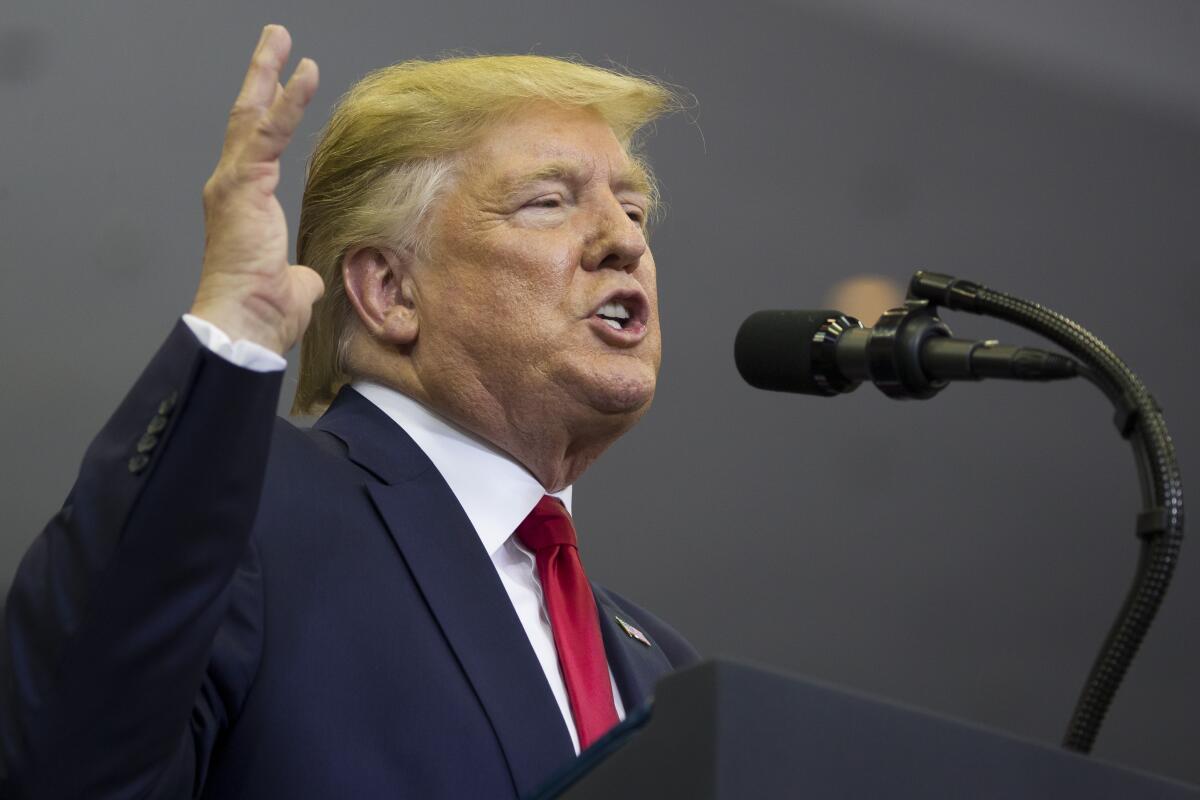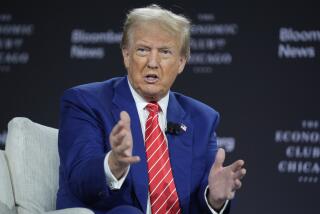Whistleblower controversy deepens as Trump suggests he discussed Biden with Ukraine president

WASHINGTON — Fueling a political firestorm, President Trump appeared to acknowledge Sunday that he discussed political rival Joe Biden with the president of Ukraine during a July 25 phone call, at the same time renewing his attacks on a whistleblower from within the intelligence community who sounded the alarm about the conversation.
The complaint, according to multiple news reports, raises concerns that Trump abused his powers by pressuring the government of the former Soviet republic to investigate Hunter Biden — the former vice president’s son who did business there — in order to harm the elder Biden’s 2020 presidential prospects.
Senior Trump aides defended the administration’s refusal to turn over the whistleblower complaint to Congress, as is generally required by statute if it is deemed urgent and credible by the intelligence community’s inspector general, as this one was.
Democrats swiftly escalated calls for a full investigation. House Speaker Nancy Pelosi (D-San Francisco) on Sunday reiterated a demand for the complaint to be turned over to the House Intelligence Committee in conjunction with scheduled testimony Thursday by Joseph Maguire, the acting director of national intelligence.
“If the administration persists in blocking this whistleblower from disclosing to Congress a serious possible breach of constitutional duties by the president, they will be entering a grave new chapter of lawlessness which will take us into a whole new stage of investigation,” Pelosi wrote in an unusual letter to colleagues on both sides of the aisle.
Republicans have been largely silent as the whistleblower story has unfolded in recent days, but on Sunday, Sen. Mitt Romney of Utah weighed in with an admonition that it was “critical for the facts to come out.”
“If the president asked or pressured Ukraine’s president to investigate his political rival, either directly or through his personal attorney, it would be troubling in the extreme,” Romney, one of the few Senate Republicans to offer criticism of Trump, wrote on Twitter.
Trump has insisted he said nothing untoward in the call with the then-newly elected President Volodymyr Zelensky. He repeated that contention Sunday to reporters outside the White House before departing for an event in Texas, calling his conversation with the Ukrainian leader “perfect.”
Later, he hinted he might be willing to release the transcript of the call, saying he would “love to do it, but you have to be a little bit shy about doing it.”
As often happens, Trump went beyond what aides were willing to say. Treasury Secretary Steven T. Mnuchin, interviewed on CNN’s “State of the Union,” said disclosing details of the whistleblower complaint would set a “terrible precedent.” And in a separate interview, on NBC’s “Meet the Press,” the Treasury secretary said it would be “highly inappropriate to release a transcript of a call between two world leaders.”
Secretary of State Michael R. Pompeo, interviewed on “Fox News Sunday,” took a similar stance, citing the necessity for “private conversations between world leaders.”
Both men deflected questions as to whether it was proper for Rudolph W. Giuliani, the president’s personal lawyer, to inject himself into matters involving U.S. foreign policy.
As details of the still-murky episode continued to emerge in published reports and public comments from some of those connected to it, Rep. Adam B. Schiff (D-Burbank) said that if it were shown that Trump leveraged U.S. foreign policy in an attempt to obtain damaging information about a political rival, “we may have crossed the Rubicon.”
Schiff, who heads the House Intelligence Committee, said on CNN that if suspicions of the president pressuring a foreign government to help his own reelection bid were borne out, Congress would have to weigh the “extraordinary remedy” of impeachment. But he called that a last resort.
In his comments to reporters Sunday morning, Trump specifically referred to Biden and his son, though imprecise syntax left room for ambiguity.
“We had a great conversation,” he said. “The conversation I had was largely congratulatory, was largely corruption, all of the corruption taking place, was largely the fact that we don’t want our people like Vice President Biden and his son creating to the — the corruption already in the Ukraine.”
Around the same time as the call, the White House withheld $250 million in military aid, meant to buttress Ukraine against Russian aggression. The aid was released last week — without explanation — after weeks of bipartisan pressure.
Last week, the president told reporters it “doesn’t matter” what he and the Ukrainian leader discussed, but he did not specifically deny mentioning Biden. The former vice president, who is seeking the 2020 Democratic nomination, has outmatched Trump in a number of public opinion polls and thus poses a significant potential political threat to the president.
On Sunday, Trump also said he would have “no problem” with Giuliani testifying before Congress about his interactions with Ukraine. The White House has curtailed or prevented the testimony of a number of administration officials in several separate investigations of the president.
Giuliani has acknowledged discussing Biden and his son with Ukrainian officials and has repeatedly made accusations of wrongdoing by both, but Schiff said direct involvement by Trump in pressuring Ukraine would be much more significant. The Wall Street Journal reported that Trump asked Zelensky about eight times to investigate Biden’s son.
“It’s one thing when done by the court jester, another when done by the man who would be king,” Schiff said. He added that it was not necessary to find an “explicit quid pro quo” — Trump making U.S. aid to Ukraine conditional on its government trying to find dirt on the younger Biden — in order for the president to have committed a grave breach.
Biden, on a campaign swing in Iowa, said Saturday that if Trump used levers of American aid and influence to try to gather dirt on him from a foreign government, it would amount to an “overwhelming abuse of power.”
Times staff writer Jennifer Haberkorn in Washington contributed to this report.
More to Read
Get the L.A. Times Politics newsletter
Deeply reported insights into legislation, politics and policy from Sacramento, Washington and beyond. In your inbox three times per week.
You may occasionally receive promotional content from the Los Angeles Times.










